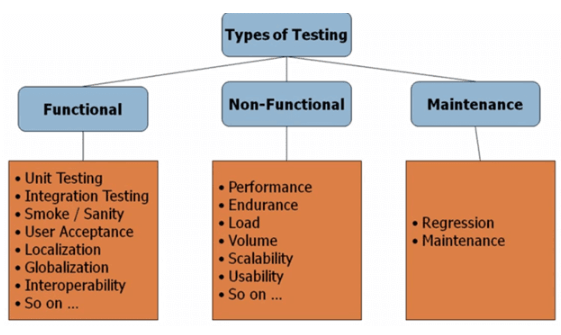Introduction
Software Testing Methodology is defined as strategies or testing types that are used to confirm the Application Under Test meets the client’s product description or not. Test Methodologies include functional and non-functional testing.
Here are some common methodologies:

Functional Testing: Some common functional testing methods are:
- Unit Testing: In Unit Testing, individual units of the software are tested. Unit Testing of software package applications is done during the development(coding) of an application. The goal of Unit Testing is to isolate a section of code and verify its correctness.
- Integration testing: Integration Testing is a level of software package testing where individual units are combined and tested as a bunch. The purpose of this level of testing is to show faults within the interaction and between the integrated units.
- Smoke Testing: In the smoke testing technique, testers examine all the basic components of a software system to ensure that they work properly. Typically, the smoke testing is conducted by the testing team, instantly once a software package build is formed.
- User Acceptance: Acceptance testing is Formal testing that is used to determine whether a system satisfies its acceptance criteria or not and lets the customer determine whether to accept the system or not. This testing is usually performed by the customer.
- Localization Testing: Part of the software testing process that focuses on adapting a globalized application to a particular culture/locale. This testing is normally done by the testing teams.
- Globalization Testing: Globalization Testing is a testing method that checks the proper functionality of the product with any of the culture/locale settings by using every type of international input possible. It is performed by the testing team.
Non-Functional Testing: Some common Non-functional testing methods are:
- Performance Testing: In Performance Testing, a tester confirms that the software will perform well under its expected workload. A software performance likes its response time, reliability, resource usage, and scalability. The goal of Performance Testing isn’t to find bugs but to eliminate performance bottlenecks.
- Exploratory Testing: Exploratory testing means the testing of a software package without any specific plans or schedules. This is a testing method where we don’t have any test cases or test planning documents to check the application.
- Load Testing: Load testing is conducted to recognize the behavior of the application under a specific expected load. Load testing is done to find out that, how will an application behave under both normal and at peak conditions.
- Volume Testing: Volume Testing is used to check the system performance of an application by increasing the volume of data in the database. It helps to analyze how a software or application response under these conditions. It is also known as Flood Testing.
- Scalability Testing: Scalability Testing is a part of non-functional tests that examines a software package to ensure that an application can handle the projected increase in user traffic, data volume, transaction counts frequency, etc.
- Usability Testing: Usability testing is used to test how easy is to use the software by testing it with real users. Users are asked to complete tasks while they are being observed by developers, to see where they encounter problems and experience confusion.
- Security Testing: Security Testing is a Non-functional testing method that ensures its data and resources are protected from possible intruders. It also tests that software systems and applications must be free from any threats, risks that may cause a big loss.
Maintenance:
- Regression Testing: Type of software package testing that seeks to uncover software package errors once changes to the program (e.g. bug fixes or new functionality). This is executed by retesting the program. This testing is performed by the testing teams.
- Maintenance Testing: Maintenance Testing is done on the already deployed software package. The deployed software package needs to be enhanced, modified or migrated to different hardware. The Testing done during this improvement, modification and migration cycle is known as maintenance testing.
People having good knowledge of Financial accounting can get an accounting certification from StudySection to increase their chances of getting a job in this field. You can get a foundation level certification if you are new to Financial accounting or you can go for advanced level certification if you have expert level skills in Financial accounting.




